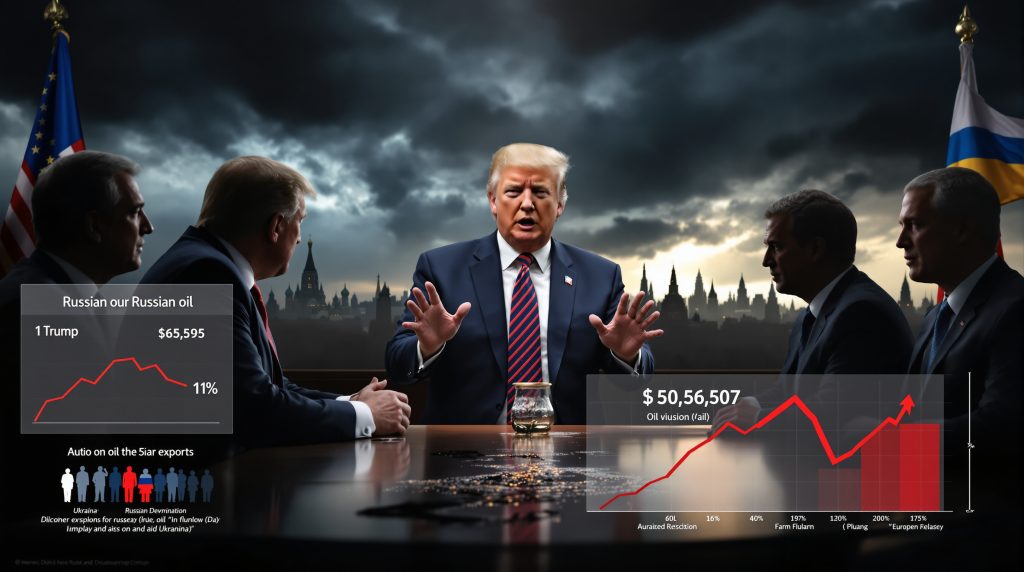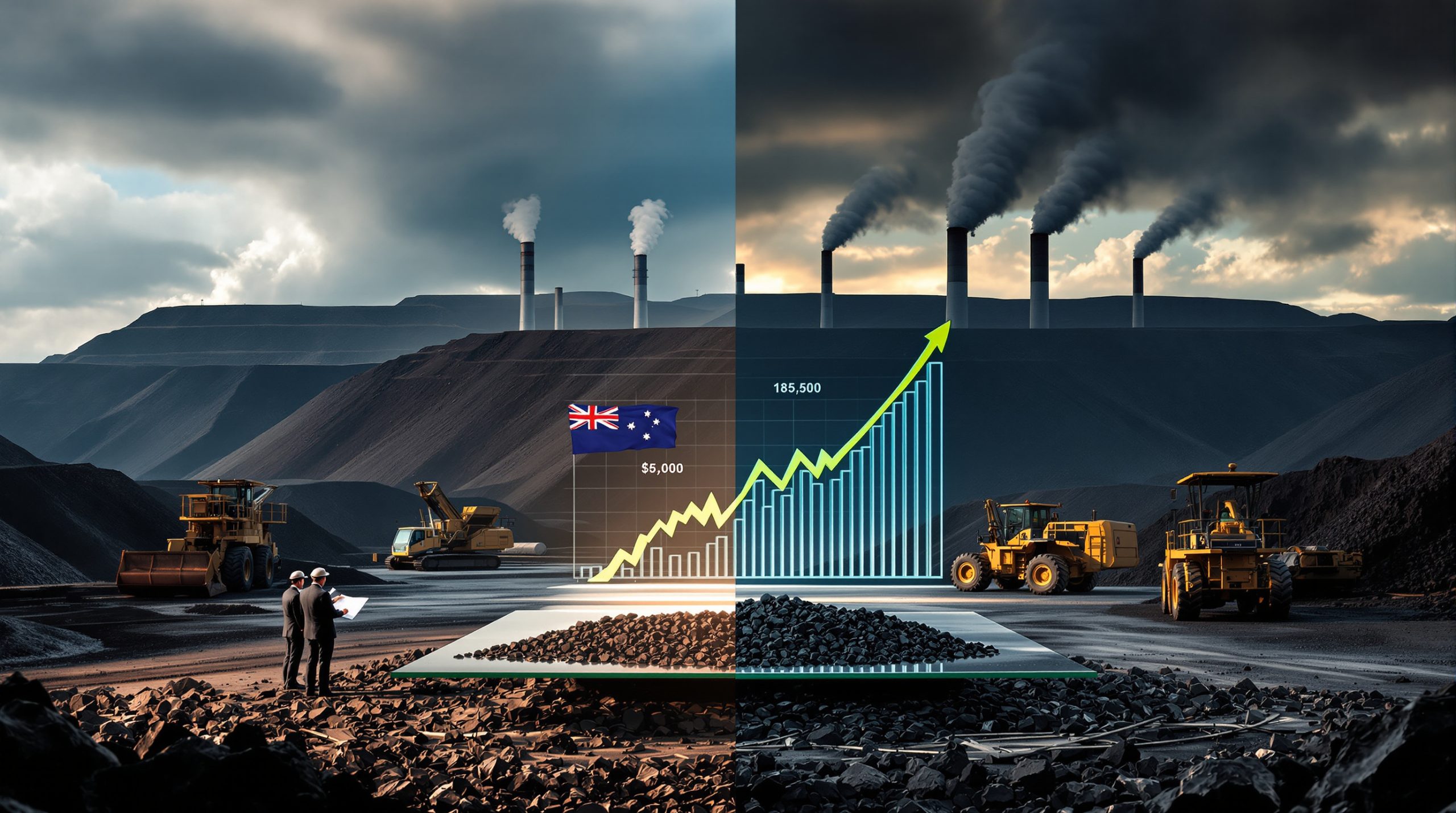Trump's Diplomatic Push for Europe to Cut Russian Oil: Geopolitical Implications
Europe finds itself under increasing pressure from the United States to completely sever remaining energy ties with Russia, particularly oil imports that continue to generate substantial revenue for Moscow. The diplomatic focus centers on eliminating financial flows that directly fund Russia's ongoing military activities, estimated at approximately €1.1 billion ($1.8 billion) from European fuel sales in just one year.
This development represents a significant escalation in Western efforts to isolate Russia economically, occurring against the backdrop of ongoing discussions about international security frameworks and frustration with Europe's pace of energy decoupling from Russian sources.
The Case for Cutting Russian Oil Imports
The primary argument for eliminating Russian oil from European markets centers on disrupting the financial support that enables Russia's military capabilities. Despite multiple rounds of sanctions and gradual reduction efforts since 2022, significant revenue continues to flow to Moscow through remaining energy purchases.
According to Eurostat data, EU imports of Russian fossil fuels totaled approximately €99 billion in 2021 before the invasion of Ukraine, highlighting the scale of economic relationship that existed prior to the conflict.
"By continuing to purchase Russian energy products, European nations are indirectly financing the very conflict they publicly oppose," noted a senior European energy analyst. "Complete severance of these ties would represent the strongest economic pressure point available."
The United States has emphasized that a unified Western stance on Russian energy imports would send a powerful diplomatic message while simultaneously constraining Russia's financial flexibility.
Europe's Russian Oil Reduction Journey
Phased Implementation Timeline
Since Russia's February 2022 invasion of Ukraine, Europe has taken a graduated approach to reducing its energy dependence on Russian sources:
| Timeline | Action | Impact on Russian Revenue |
|---|---|---|
| December 2022 | EU banned seaborne crude oil imports | Major reduction in direct crude purchases |
| February 2023 | Ban on refined fuel imports implemented | Further restriction of energy revenue streams |
| January 2028 | Proposed complete phase-out deadline | Target for complete energy decoupling |
The European Commission's proposed legislation aims to completely eliminate EU imports of Russian oil and gas by January 1, 2028, representing the most comprehensive attempt to date to sever energy ties with Moscow.
Continuing Exceptions and Loopholes
Despite significant progress in reducing Russian energy imports, several exceptions and workarounds continue to allow Russian energy products to reach European markets:
-
Hungary and Slovakia maintain Russian energy imports under special exemptions granted due to their heavy dependence on Russian pipeline infrastructure
-
Refined products processed from Russian crude in third countries (particularly India) continue flowing into European markets
-
Maritime shipping and insurance loopholes have allowed some Russian energy exports to circumvent restrictions
-
Certain financial channels remain available for energy-related transactions
Energy security analysts point out that these exceptions significantly weaken the impact of sanctions. "As long as these exemptions exist, Russia maintains critical revenue streams that help sustain its economy despite broader sanctions," explained a European energy policy specialist.
New Measures and Policy Responses
Price Cap Mechanisms
The G7 price cap on Russian seaborne crude oil was set at $60 per barrel in December 2022, representing a coordinated international attempt to limit Russia's oil revenue while still allowing some energy to flow to global markets to prevent price spikes.
The price cap mechanism functions by prohibiting Western companies from providing shipping, insurance, and financial services for Russian oil sold above the specified price threshold, effectively creating a ceiling on what Russia can earn from its exports.
Enhanced Sanctions Framework
Beyond price cap adjustments, the European Union has expanded its sanctions framework to include:
-
Stricter monitoring of maritime shipping carrying Russian energy products
-
Enhanced financial restrictions on entities facilitating Russian energy exports
-
Targeted measures against specific Russian energy companies and executives
-
Increased support for alternative energy infrastructure development within the EU
"These measures represent a dual approach of constraining Russia's current revenue streams while simultaneously investing in infrastructure that reduces Europe's long-term need for Russian energy," explained an international energy market analyst.
Transatlantic Alliance Dynamics
The transatlantic relationship regarding energy policy highlights growing tensions within the Western alliance regarding burden-sharing and strategic priorities. The U.S. position emphasizes that European nations must take greater responsibility for their own energy security and independence.
This approach reflects a broader foreign policy perspective that allied nations should assume more costs and responsibilities for collective security arrangements, particularly when their geographic proximity to the conflict zone makes them more vulnerable to potential fallout.
The Role of Security Guarantees
The timing of these diplomatic developments coincides with critical discussions about post-war security frameworks. The concept of a "Coalition of the Willing" comprising 26 countries has emerged as a potential post-conflict security model for the region.
European leaders have indicated that this framework could include troop deployments away from conflict zones to provide reassurance and deterrence against future aggression—a proposition that has been categorically rejected by Russian officials.
Russia's Strategic Response
Rejection of Foreign Military Presence
The Kremlin has unequivocally dismissed the possibility of foreign troops being stationed in Ukraine as part of any security guarantee framework. Russian officials have stated that Moscow is prepared to "resolve all our tasks militarily" if an acceptable peace agreement cannot be reached.
According to a recent report from Reuters, Russian diplomatic representatives have reinforced this position, stating definitively that security guarantees provided by foreign military contingents "would not be acceptable to our country."
Energy Diplomacy Pivot
Despite Western pressure, Russia has actively pursued alternative energy partnerships, particularly with Asian markets:
-
Expanded supply agreements with China, including negotiations for a major new gas pipeline known as Power of Siberia 2
-
Significantly increased crude oil sales to India at discounted prices
-
Development of alternative payment mechanisms to circumvent Western financial restrictions
-
Investment in new export infrastructure oriented toward non-Western markets
Russia's pivot to Asian energy markets has partially offset the impact of Western sanctions, with China and India becoming particularly important customers for Russian crude oil, according to data from the International Energy Agency.
Ukrainian Perspectives on Energy and Security
International Security Frameworks
Ukrainian officials have consistently emphasized the critical importance of broad international involvement in any post-conflict security guarantees for their country. This position reflects a strategic understanding that multilateral commitments provide stronger assurance than bilateral arrangements.
Ukrainian leadership has particularly stressed the need for concrete security mechanisms rather than declarative statements, pointing to historical examples where security assurances without enforcement mechanisms proved insufficient.
Rejection of Russian Preconditions
Ukrainian officials have firmly rejected Moscow's suggestion that potential peace talks could take place in Russia, interpreting this as evidence that "Russia does not want to have a meeting." The Ukrainian position remains that any meaningful negotiations must occur on neutral ground with international guarantees.
"Negotiations must be based on respect for sovereignty and territorial integrity," a Ukrainian government representative stated. "Any framework that doesn't acknowledge these principles cannot lead to sustainable peace."
Market Implications of Energy Policy Shifts
Oil Price Volatility
The ongoing geopolitical tensions and policy shifts regarding Russian oil exports have contributed to significant volatility in global energy markets. Recent trade war oil movements have further complicated the energy landscape:
-
Brent crude has experienced fluctuations between $60-70 per barrel amid uncertainty about future supply constraints
-
WTI crude has traded in the $55-65 range, with recent prices at approximately $62.12 according to market data
-
Refined product markets, particularly diesel and heating oil, have shown heightened sensitivity to policy announcements
-
Market uncertainty has increased risk premiums in energy futures contracts
Energy traders note that the market is particularly sensitive to announcements regarding sanctions enforcement or new restrictions on Russian exports, creating periodic price spikes followed by corrections as supply adjustments are made.
European Energy Security Investments
European nations have accelerated investments in alternative energy infrastructure in response to the push for reduced Russian imports:
-
LNG terminal capacity expansion across multiple EU member states
-
Increased pipeline interconnections to diversify supply routes
-
Accelerated renewable energy development projects
-
Strategic petroleum reserve expansions to buffer against supply disruptions
These investments represent both a short-term response to current energy security challenges and a long-term strategic shift toward greater energy independence and diversification of supply sources. Additionally, analysts have been closely monitoring OPEC's market influence as global oil dynamics continue to evolve.
Potential Future Scenarios
Escalation Pathways
Several factors could drive further escalation in energy-related tensions:
-
Additional sanctions targeting the remaining Russian energy exports to Europe
-
Expansion of secondary sanctions against entities facilitating Russian energy trade
-
Retaliatory measures from Russia, potentially including complete cutoffs to remaining European customers
-
Increased maritime enforcement actions against vessels carrying Russian energy products
Energy security experts warn that escalation could trigger significant price volatility and supply disruptions, particularly for European nations still in the process of developing alternative supply infrastructure. Recent discussions regarding Trump tariffs and oil rally effects have added another layer of complexity to these scenarios.
De-escalation Possibilities
Conversely, several developments could lead toward de-escalation:
-
Diplomatic breakthrough between conflicting parties
-
Coordinated international approach to energy sanctions that balances security and economic concerns
-
Technical solutions that allow continued energy flows while limiting Russian revenue
-
Development of alternative supply sources that reduce the economic impact of Russian energy cutoffs
"Finding a balanced approach that maintains pressure on Russia while ensuring energy security for European consumers remains the central challenge for policymakers," noted an international relations specialist.
Long-Term Strategic Implications
Reshaping Global Energy Flows
The pressure to eliminate Russian oil from European markets is accelerating a fundamental restructuring of global energy flows:
-
Russian exports increasingly redirected toward Asian markets
-
Middle Eastern producers expanding European market share
-
U.S. LNG and oil exports growing to fill European supply gaps
-
Development of new production in Africa and South America to meet global demand
This redistribution of global energy trade patterns represents one of the most significant shifts in international energy markets in decades, with long-lasting implications for pricing, infrastructure investment, and geopolitical relationships. The Alaska policy shift regarding drilling regulations has also become an important factor in the North American energy production landscape.
Energy Transition Acceleration
The geopolitical tensions surrounding Russian energy exports have provided additional impetus for Europe's energy transition efforts:
-
Increased political support for renewable energy investments
-
Enhanced focus on energy efficiency measures
-
Accelerated electrification of heating and transportation
-
Growing interest in nuclear power as a source of energy security
"The current crisis has transformed energy policy from a primarily environmental consideration to a central national security priority," observed a European policy analyst. "This shift has created unprecedented political will for rapid transformation of energy systems."
Conclusion: A Complex Energy and Security Landscape
The diplomatic pressure on European nations to cut Russian oil imports represents a significant escalation in Western efforts to isolate Moscow economically. This push occurs against the backdrop of ongoing discussions about international security frameworks and reflects growing frustration with the pace of Europe's energy decoupling from Russia.
The situation highlights the complex interplay between energy policy, security considerations, and economic interests that continues to shape the international response to regional conflicts. According to analysis from Fox News, these tensions are further complicated by concerns about funding for ongoing conflicts.
For stakeholders in the energy sector, this evolving situation underscores the need for diversified supply chains, flexible infrastructure, and strategic planning that accounts for the growing intersection of energy markets and geopolitical considerations. Furthermore, experts have been closely studying potential oil price crash analysis scenarios to prepare for possible market disruptions in the coming months.
Want to Discover the Next Major Mining Stock Before the Market Does?
Take advantage of Discovery Alert's proprietary Discovery IQ model for instant notifications on significant ASX mineral discoveries, turning complex data into actionable insights for both short and long-term investors. Visit the Discovery Alert discoveries page to understand why historic discoveries have generated substantial returns for early investors.




